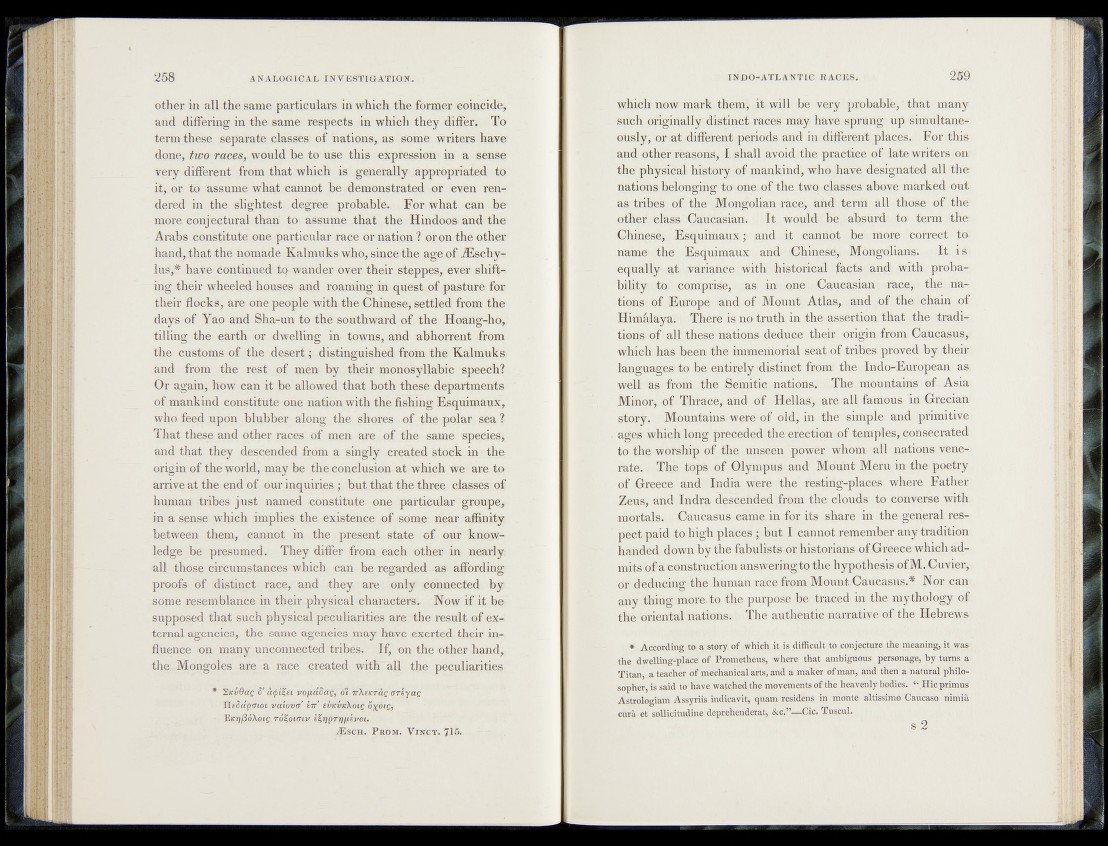
other in all the same particulars in which the former coincide,
and differing in the same respects in which they differ. To
term these separate classes of nations, as some writers have
done, two races, would he to use this expressics®5 in a sense
very different from that which is generally appropriated to
it, or fo assume what cannot be demonstrated or even rendered
in the slightest degree probable, For what can be
more eonj eetural than to assume that the Hindoos and the
Arabs constitute one particular race or nation ? or on the other
hand, that the nomade Kalmuks who, since the age of JEschyt
lus,* have continued tip wander over their steppes, ever shifting
their whaled houses and roaming in quest; of pasture for
their flocks, are one people with the Chinese, settled from the
days of Yao and Sha-un to the southward of the Hoang-ho,
tilling the earth or dwelling in towns, and abhorrent from
the customs of the desert; distinguished from the Kalmuks;
and from the rest of men by their monosyllabic speech?
Or again, how can it be allowed that both these- departments
of mankind constitute one nation with the fi^nhg Esquimaux^
who feed upon blubber along the shores of the polar se% $
That these mid other races" of men are of the same species^
and that they descended from a singly created stock in - the-
origin of the world, may be the conclusion at which we are to
arrive at the end of our inquiries; but that the three classes of
human tribes ju st named constitute one particular groupe,
in a sense which implies the existence of some near affinity
between them, cannot in the present state of our knowledge
be presumed* They differ from each other in nearly;
all those circumstances which can be regarded n s affording
proofs of distinct race, and they are only connected by
some resemblance in their physical characters. Now if it be-
supposed that such physical peculiarities are the result of external
agencies, the same agencies may have exerted their influence
on many unconnected tribes. If, on the other hand,;
the^Mongoles are a race created with* all the peculiarities
* HkvGccq vo/j,ddag, oi irXeKrtic oreyag
HeSdpirioi vaiovff’ for svkvkXoiq $%di£,
- JLierifioXoig tq^omtiv s%r}fr7i[isvoi.
ipscH. P hom. VlNCT. 716.
which now mark them, it wilUdfe1 very probable,'that many
S'jick originally distinct, traces may have sprung -up simultaneously,
or- at differenipepods and in different -places. ' For this
and other .reasons, :L shalbffvéM the practice of date writers on’
the phy sical history ; off-mankind, who have designated all the
nations belonging. tM'©me;.of,iiie Ttwp; classes! above marked out
as ‘tribes of the Mongolian reed; and term all those of the
othertclashtOePfcsasia®. It would be -absurd to term the
Chinese, Esquimaux ;r upd.fffc ,;jGan>ndtf;be more ; correct to
name the -Esquimaux and Chinese^ Mongolians. It i s
equally:, at wariancq|^wifWhistorical *facts.- and with’.probability
t o ©Ordpriie,.'. /as., in 1 ujuif.'Caucasian;, rece,». the nations
of Europe and ôfi Mount Atlas, rend of the chain of
Himalaya! There'i^roifruth-in the .assertion that/Ahe^ traditions
of all{,thè^è'1 motions dedu^e| their ^origin froim Caucasus,
which, has b'ê®n the immemorial seat of tribes proved by their,
langnag©s*fto he'entirely distinct from' live f n do-Europea'n as
well as from the Semitic .nations. The mountains of. Asia
Minor, of-Thrace, and of Hellas>;:ar$ all famous- in Grecian
story. Mountains twere\of old, in the simple! and primitive
agfesj which long preceded the erection of tempi es,' consecrated i
to thesworship ;of ;tbej, unseen power whom all nations vene-
r’ateu The tops p-f Olympus and Mount' Meru- in the-poetry
of 'Gree'ck ahd India! were the resting-placçsii whops; Father
Zeus, and Indra descended from the. clouds to converse .with,
mortals; ’Caucasus came.in.for its share in the general res-
peet paid to high placés:; but I cannot remember'any tradition
handed down by the fabulists or historians of Greece which admits
of a construction answering to the hypothesis of M. Cuvier,
or d educing the human race from Mount; Caucasus.* Nor can
any thing more.to the purpose be traced in the mythology of
the oriental nations. The authentic narrative of the.Hebrews
* According to! a story of ;which it, is difficult to conjecture the.meaaiingj.it was.
fhe dwelling-place of Prometheus, where that ambiguous personage, by turns a
Titan, a teacher of mechanical arts, and a maker of mail, and then a natural philosopher,
is said to'Üavè watched the movements of the heavenly bodies. “ Hieprimus
Asttologiam Assyriis ind’icavit, quam residens in monte altissimo Caucaso nimiâ
cura et sollicitudine deprehenderat, &c.”—Cic. Tuscul.
S 2